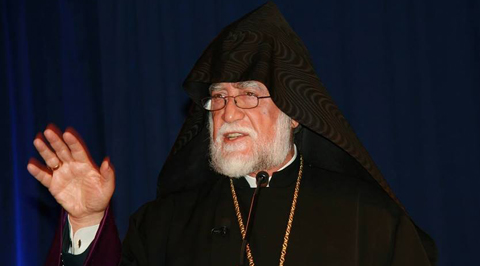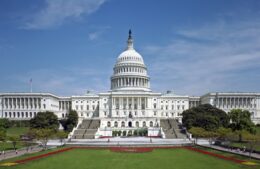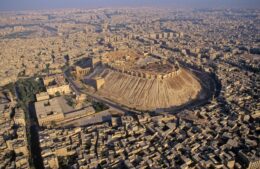Pontifical Encyclical by His Holiness Aram I dedicated to the Centenary of the Armenian Genocide
- (0)
Pontifical Encyclical by His Holiness Aram I dedicated to the Centenary of the Armenian Genocide –

2015 is not just another year. As the 100th Anniversary of the Armenian Genocide, it carries a special meaning, a special message and a special purpose. Every Armenian and the entire nation should reflect on the unique significance and special importance of the occasion.
The Armenian Genocide has left its permanent scar on the common memory of the Armenian people. There is not a single Armenian on earth who has not had the Genocide blended with his blood and cemented with his life. There is no Armenian family on earth who has not been affected by the Genocide and its repercussions.
For one hundred years, we have remembered with prayers and vigils our one and a half million martyrs who were the victims of a carefully planned and systematically executed genocide of the Ottoman-Turkish government in Western Armenia and Cilicia.
For one hundred years, we have remembered with grieving hearts and indignation the perpetrators’ destruction of our centuries-old cultural and religious treasures, our monasteries and churches, manuscripts and cross-stones and many more sacred artefacts.
For one hundred years, we have remembered with unrelenting spirit the confiscation of thousands of our national, church and personal properties by Turkey.
As a consequence of the 1915 Genocide and deportations, towns and villages in both historic Western Armenia and Cilicia, which had been inhabited by the Armenian people for centuries and which prospered with their creative spirit, were emptied of Armenians. The intention of the Ottoman authorities was to exterminate the Armenians and wipe out Armenia from the world map. How well the words of the Psalmist apply to the death and destruction caused by the Genocide: “O God, the heathen are come into thine inheritance; thy holy temple have they defiled; they have laid Jerusalem on heaps. The dead bodies of thy servants have they given to be meant unto the fowls of heaven, the flesh of thy saints unto the beasts of the earth. Their blood have they shed like water round about Jerusalem; and there was none to bury them” (Psalm 79: 1-3).
Uprooted from their ancestral lands, the children of this refugee and orphaned nation have neither forgotten the memory of their martyrs nor have they forsaken their legacy. They heard Christ’s message: “And fear not them which kill the body, but are not able to kill the soul: but rather fear him which is able to destroy both soul and body in hell” (Math. 10:28). Motivated by this conviction and reinvigorated with the anticipation of a new beginning, they engaged in community-building. Thus, they restructured both their private and communal lives; they erected schools and churches; they founded new organizations across the Diaspora. Furthermore, they reminded Turkey and the international community of the unpunished Genocide and demanded justice.
Throughout the past hundred years, our church, committees of the Armenian cause, our political organizations and, during the past two decades, the government of the Republic of Armenia, have worked hard for the recognition of the Genocide, mainly through inter-church, inter-religious and political contacts and lobbying. A large number of states, churches and organizations have formally recognized the Armenian Genocide. Many Armenian and non-Armenian scholars, who have published studies on the Genocide, have stressed the crucial importance of recognizing the first genocide of the 20th Century.
Hence, despite tremendous difficulties, our nation has remained faithful to the sacred legacy of our martyrs, recalling the Psalmist, “If I forget thee , O Jerusalem, let my right hand forget her cunning. If I do not remember thee, let my tongue cleave to the roof of my mouth; if prefer not Jerusalem above my chief joy” (Psalm 137: 5-6).
Indeed, for one hundred years, our valiant generations remembered their martyrs and sought to open the dispassionate hearts and minds of humanity, challenging people of good will and those concerned with justice and respect of human rights to recognize the Armenian Genocide and the legitimate rights of their nation.
Beloved Armenians,
Our people must continue this sacred struggle with strong determination and profound faith. The time has come for us to explore new perspectives and grounds within the bounds of international law, and to pursue our claims for reparation and recovery of our violated human rights in a more structured and comprehensive way.
The Genocide Convention clearly states that the perpetrators of genocide, be they individuals, organizations or states, should appear before the International Court of Justice. International law also indicates that the recognition of genocide implies reparation. Hence, the recognition of the Armenian Genocide should not be considered the ultimate aim of the Armenian Cause. Recognition and compensation are closely inter-connected and, therefore, they should constitute the basis and target of our claims. Although Turkey is using its political and economic influence to frustrate this process, our people are called upon to continue their journey with greater conviction and deeper commitment.
The Armenians in Armenia, Karabagh and the Diaspora are preparing to commemorate the Centenary of the Genocide with a profound sense of responsibility and firm determination. This should not be an ordinary commemoration, a repetition of the past; it should stand out as a turning point by breaking new ground and opening new horizons. The Centenary is a defining moment in our people’s rightful campaign for the restoration of their legitimate rights. This coming 23rd April 2015 the two Catholicoi of the Armenian Church shall jointly preside, in Holy Etchmiadzin, over the canonization of our Martyrs, which will be a unique event within the sphere of the Centenary commemoration.
It is vitally important, as we look beyond the Centenary, to recognize that the world is volatile and that geopolitical realities and interests often compel us to reassess our tactics and approaches. We must remain vigilant and united.
The Armenian Cause is the cause of the entire Armenian nation; it is the cause of our martyrs; it is the cause of future generations. Hence, every Armenian is called to contribute to the collective effort to restore our violated human rights.
Hence, we call upon
• Our dioceses, to solemnly commemorate the memory of our martyrs by organizing public events and activities,
• Our community organizations, to plan together and through their contacts and networks, to advocate for our just cause.
• Our schools, to convey through lectures and seminars to Armenian students the true spirit and message of the Centenary of the Armenian Genocide.
• Our intellectuals, to carry out research and to publish works on different aspects of the Armenian Genocide.
• Our entire nation, to play a proactive role in the promotion of the Armenian Cause, which is indeed a cause of justice.
Let the memory of our one-and-a-half million martyrs live always amongst us and let their legacy remain vivid in our personal and communal lives.
Empowered by our Christian faith and strengthened with the memory and message of our martyrs, let us forge the future of our youth.
May the blessing of the Father, the love of the Son, and the grace of the Holy Spirit be with you all, Amen.
ARAM I
CATHOLICOS OF THE
HOLY SEE OF CILICIA


















